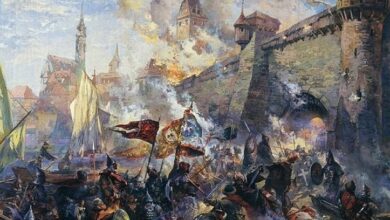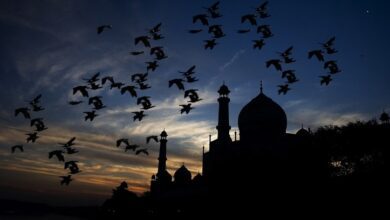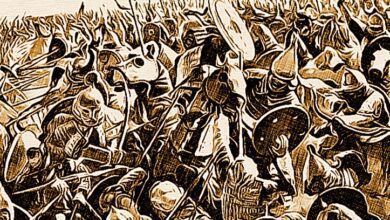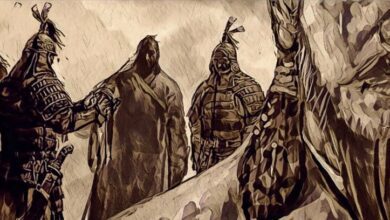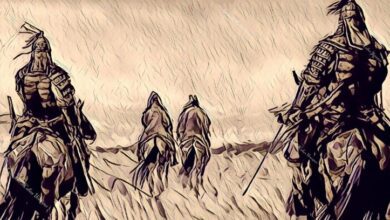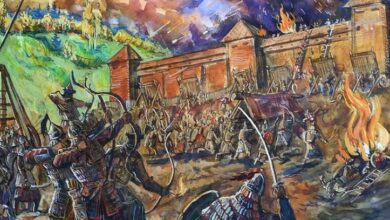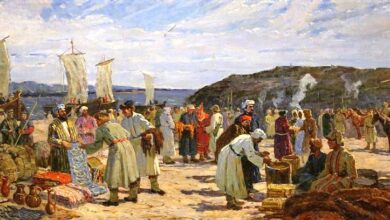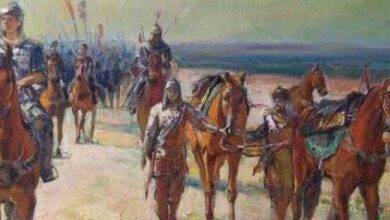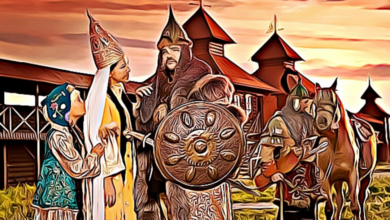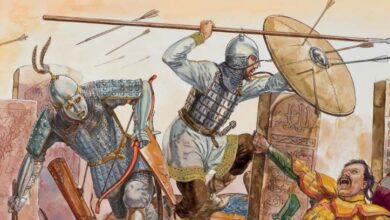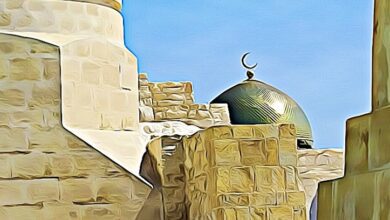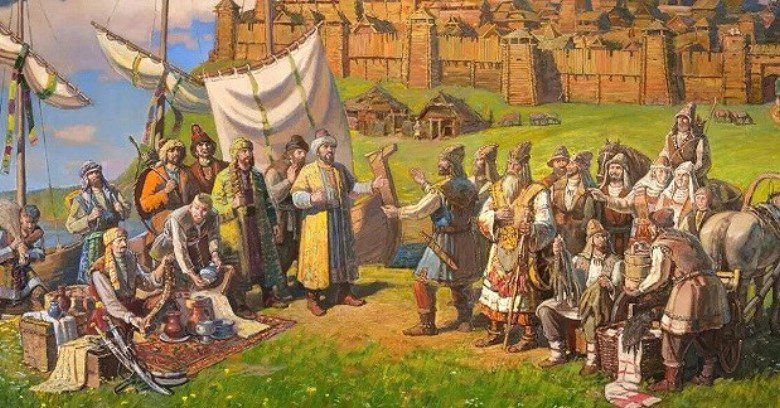
Ghazi Baraj Tarihi. Chapter 3. Time of the Bulgar Baltavars
FROMThe yn of the Khon Kan Alyp-bi with a corps of Bulgars and Khons crushed the Sadumians and forced them to flee to Altyn Vash and Rum. Then Alyp-bi with his Bulgars, who experienced a lot of trouble in Azerbaijan from the Rumians, crossed the Sula and defeated the 80,000-strong Rum army near the city of Dere. The Rum Kan Balyn fled to his palace, but was surrounded and burned by the Khons, who thus dealt with the leaders of the enemies. When the palace burned down, Alyp-bi rode into the ashes and discovered the Kan crown. He took it and brought it to his father, who called himself Kan, but died suddenly at a feast on the occasion of the victory. Alyp-bi became the Kan of the Khon power formed in Saklan and rested at one time on Mount Kuyan-tau or Kuk-Kuyan. 14 Before his death, Kan-Dere, as he was also called, ordered to put on his grave a huge sign of the Dulo clan - “Baltavar”. And it looks like this: Ψ, where the sign 1 marks the ax, and the sign w indicates the bow. These items were considered by the Bulgars as symbols of royal power. At the burial site of Kan-Dere, the Uruses settled, revering him for the defeat of their enemies - the Sadums, and formed the village of Askal. Alyp-bi was also revered by the Bulgars, for under him they became the ruling people of the Khon state. Pretty soon, part of the Khons formed one tribe with the Bulgars, which adopted the name of the Bulgars and the Turkic language of the Khons. The main clans of the Bulgars are called Erdim, Bakil or Boyandur, Seber, Agachir, Kharka, Utig, Chimer…
The grandson of Alyp-bi, the son of Aibat, Kan Atille Aibat, nicknamed Audan (Audon) Dulo, went against the Almanians and farangs because their king poisoned his wife, the sister of the Kan. Having defeated the strongest Alman tribe Galidzh so that part of it fled across the sea Kuk Dingez to the islands of Sadum and Galidzh, Atille laid siege to the capital of the farangs Altyn Vash at night. It got its name from the golden domes of its houses. But in the morning the sun rose, and the sparkle of the golden roofs blinded the Bulgars. The frightened Bulgars fled away, not understanding the road, and after that their influence was shaken. Atille, whom the Ulchians called Myshdauly, died during the retreat in the land of the Almanians, and the state fell apart.
Three sons of Atille, three brothers - Illak, Tingiz and Bel-Kermek, together with the Bulgars and Ulchis, fortified against the farangs in the camp, but were defeated. Illak fell in battle, and Tingiz and Bel-Kermek with the Bulgars received the right to leave the camp. They went to the mouth of Buri-chai and along the way they lost Tingiz, who was killed from an ambush by the Galidjians. When breaking through this ambush, Bel-Kermek for the first time ordered to raise the red banner of aces with a crescent on the shaft as a banner. From Bel-Kermek came the genus of Bulgar kings, who were called either Kans or Baltavars, because the word "Baltavar" acquired the meaning of "leader".
Chapter 3. Time of the Bulgar Baltavars
The place of settlement of the Bulgars between the mouth of Buri-chai and Dzhalda, where the cities of the Rumians were located, was named by Bel-Kermek Altynob - in memory of the siege of Altyn Bash. The abandoned camp then became a city, which the local Ulchians called Galidzh, and the Bulgars called "Uchuly" ("[City] of the Three Sons [Atille]").
And after Bel-Kermek, the Baltavar of the Bulgars was his son Dzhurash Masgut, and after him his son Tatra, and after him his son Boyan-Chelbir, and after him his son Tubdzhak, and after him his eldest son Arbuga Yurgan, and after him - his younger brother Alburi ...
Even under Bel-Kermek, Sabars broke into Saklan, whom the Bulgars called Sabans in Saklan. From them came our language, which the Persians erroneously call Kypchak, because the Kypchaks themselves adopted it from the Kyrgyz and at the same time pretty much spoiled it. The same Sabans who remained in Turan were most often called Badjanaks. Their language, as I already wrote, gradually became similar to the language of the Uz or Turkmen, and the Almighty inspired Mikail to make this language our written language, along with Arabic. The Kashanians called it the Bulgar Türks, and the Türkmen called it “Turan Tele”…
The birthplace of the Sabars was Semirechye, from where they were expelled by the Avars - the last fragment of the Khons who remained in Khin. But these refugees in Saklan behaved no better than their persecutors and beat many Khon clans. They drove part of the local Khons behind the mountains of Kaf, where they formed their Khondzhak bekdom. The other Khons were forced out by the Sabars to Djurash, where they were forced to join the Bulgars...
The Murdases, who hated the Khons, united with the Sabars and wanted to put an end to the Khons and the Bulgars who had accepted them, but Bel-Kermek intermarried with the Bek of the Masguts, who were terrible for the Murdas, and thereby saved his people from extermination...
The son of Bel-Kermek - from the daughter of the Masgut bek - Dzhurash, nicknamed Masgut, served first one, then another Sabar bek and received lands between Sula and Dzhalda for this ... Being kind by nature, he redeemed one hundred Khon biys and a large number of their people from the Sabars and attached them to the Bulgars under the name of Surbians (Serbs)...
The son of Masgut Tatra became famous for his successful raids on Rum, which he carried out with the help of the Ulchis subject to him ...
During the reign of the Tatra's son Boyan-Chelbir, Avars expelled by the Khazar Turks came to Saklan. The Sabars, who were terribly afraid of them, fell silent, and our Bulgars, on the contrary, raised their heads... Boyan-Chelbir fraternized with the Khakan Avars Tubdzhak and gave his son his name, and he took the name of Boyana. Following the Avars, their persecutors appeared - the Khazar Turks, but the Bulgars, together with the Avars, in a fierce battle threw them back from Sula and Buri-chai. The Turks retreated, but took away with them part of the Jaldai Bulgars and allowed them to form their own Burdzhan bekship in Djurash to protect their possessions from the south. After all, the Bulgars from the time of the Kan-Derei battle were considered the most skillful and brave warriors in the world. Therefore, these Bulgars began to be called Burdzhans, and their eldest son, Boyan-Chelbir Atrak, headed them. The Western Bulgars of Boyan-Chelbir, who remained dependent on the Avar Khakans, began to be called Kara-Bulgars, that is, Western, and not black, as the Turks understood. After all, the Bulgars called the west "kara", the east - "ak", the north - "kuk", and the south - "sara" or "sary"...
16
The son of Boyan-Chelbir Tubdzhak fought on the side of the Avars with Rum and the Ulchians subordinate to the Rum. While the Avars mercilessly killed the Ulchians, the Bulgar Baltavar spared them and brought up to two hundred thousand from Rum to their possessions. These Bulgar Ulchians began to be called Anchians (anchylar), that is, "border", "outlying", as they were settled on the northern borders of the beylik (beylik) of Kara-Bulgar - in Uchuly and Buri-chai. Khakan Avar initially treated this with irritation, but when, on the orders of Tubdzhak, the Anchians made several hundred boats and successfully fought on them with the Rumians, he relented and left them alone ...
In 605, Tubdzhak, having reigned for 15 years, died, leaving his eldest son Bu-Yurgan an extensive backing from Uchula to the Aksu River and from Kuk-Kuyantau to Dzhalda. And the new Baltavar of the Kara-Bulgar was out of luck very soon. Khakan Avars besieged one Rumian city, and, as always, the Anchians were the first to attack him, followed by the Bulgars. When the Khakan decided that the forces of the defenders were broken, he ordered the Bulgars to give way to their Avars. But the Rums defeated the Avars, and the khakan, in a rage, blamed Bu-Yurgan for the defeat and ordered to raise the younger son of Tubdzhak, Alburi, to the throne of the Baltavars of Kara-Bulgar. The displaced Bu-Yurgan went with a part of the Bulgars to the Rumian part of Dzhalda and was hired to serve the Rumians there. He was distinguished by such extraordinary strength that he was nicknamed Ar-Buga.
His stay in the Rumian service was short-lived, for the power of the Avar Khakan soon after his defeat was shaken, and he was able to return to his beloved river Buga-Idel. The Baltavar himself roamed between the rivers Burat and Buga-Idel, and had the village of Kashan as his headquarters. The eldest son of Alburi - Kurbat then roamed between the Saklan aul Askal on Buri-chai and the aul of Kharka on Aksu and the aul Baltavar had a headquarters ...
In 618, the distraught Avar khakan called Alburi to him, as if for negotiations, and treacherously executed him at his headquarters for the attack of the Anchians on the Avars. Meanwhile, the Avars themselves attacked the Galidjian Ulchians and stole their cattle. At the same time, several Avars were killed by the Anchians who resisted the robbery, which allowed the sardar of the Avars to pretend to be a victim of the Ulchi attack ... Before Alburi's trip to the Khakan, Bu-Yurgan saw in a dream a piece of red cloth, in which the Ases wrapped the dead, and the tip of a spear. Waking up, he said in alarm to his brother: “Tangra made me a boyar and showed me signs of misfortune in a dream: red cloth for the dead and the tip of a spear on which the heads of the dead are planted. This indicates that death awaits you in the headquarters of the hakaia. Don't go there!" Alburi did not listen to him and died. And the people recognized Bu-Yurgan as a boyar or askal, that is, a soothsayer...
When the news of the murder reached the Bulgars, Bu-Yurgan went to Rum and declared there that the Kara-Bulgar was breaking all ties with the Avars and was ready to conclude an alliance with Rum against them. The delighted Rum Kan immediately recognized the Bek as an independent Baltavar of the Kara-Bulgar and made an alliance with him... When Ar-Buga arrived to his people, the biys wanted to immediately raise him to the Bulgar throne. But Bu-Yurgan valued the title of boyar more than the Kan title, and so he told people: “The people, of course, are free to choose their own rulers, but not from the boyars appointed by Tangra ...” On his advice, the Bulgars elected their son Alburi, Kurbat, as their Baltavar. nicknamed Bashtu, who immediately began to prepare for a war with the Avars. By order of Kurbat, his younger brother Shambat in 620 erected the city of Bashtu on the site of the village of Askal in the mountains of Kuyantau and set out from it at the head of a large detachment of Bulgars, Anchians and Saklan-Rus against the enemy. He managed to quickly defeat the Avars and capture their country. In this he was helped by the local Ulchis, as well as the Bashkorts, who called themselves "Khonturchy" (Khonturchi) and were dissatisfied with the rule of the Avar Khakan. But after this, Shambat proclaimed himself an independent ruler, and called his state Duloba, that is, "Dulo Nomad". Kurbat, learning about this, ordered his brother to return to his service, but he refused and received from Bashtu the nickname "Kyi" ("Cut off", "Separated").
Shambat sat in Dulob for thirty-three years and gained great fame for victories over farangs and almans. Artanians, Baylakians, Galidjians, Avar Ulchians, Saklans, and Khonturchians came to serve under his banner. But still, in the end, he was defeated by farangs and returned to the service of Kurbat. Baltavar ordered Shambat to take his former post - the governor of Bashtu ...
The inhabitants of the city loved him so much that they called the Bashtu citadel after him - "Shambat", and the whole city - his nickname "Ky". And now the Anchians call Bashtu "Kyy"...
While Shambat fought in Dulob, Kurbat tirelessly expanded the limits of Ak Bulgar Yorta. Taking advantage of the unrest in the Turanian Horde, he drove the Khazar Turks out of Djurash and became the master of everything between Sula and Idel. Out of a desire to further humiliate the defeated Avar and Turanian rulers, Kurbat, along with the title of Kan, takes their title of Khakan ...
18
Baltavar roamed between the city of Bandja on the Azak Sea and the headquarters of Khorysdan, which was also called Batavyl, that is, the princely headquarters ... On the way back, the khakan certainly visited the headquarters of Tiganak and Baltavar and the burial place of Bu-Yurgan located from it [him, them] in the day of the journey. And the mother of this famous boyar was from the Yurgan clan of the Khon tribe Khot or Hotrag. And in ancient times, this tribe was called Sohot or, in Serbian, Hol, but then this word took on the form of Hot or Hotrag. And of all the Khon tribes, only the Utig or Utyak tribe could compete in strength and numbers with the Khotrags. And after the defeat of the Khons by the Chins, Turks and Serbs, under the Kan Tigan, nicknamed Khin-Batyr, the Khots and Utigs fled in different directions. The Khots settled on the Sob or Sobol (Subyl) River, its right tributary the Baigul and its left tributaries the Sasy-Idel and Tora-su. And Sobol flows into the Chulman Sea. Kardingese and Karadingese are but bays of this vast sea. The name of the great river Sobol was given to the descendants of the Khots, who settled in its region and, led by biy Tuba, together with the Kara-Oimeks, entered the State during the reign of Kolyn and his son Anbal. And since the best martens in the world were brought from here, they also received the name “sable” from us.
However, regarding the origin of the name of sables, Abdallah bin Bashtu told the following story.
Under Baltavar Alyp-biy - Aibat's grandfather - the Bulgar merchant Toyma, nicknamed Tura, went to the land of the Bashkorts, also called Sebers. Having stayed there, he went further north and ended up in the country of the Urts. And now the Urts live on the very edge of the Earth, on the shores of the Chulman Sea, and once they lived in the province of Tubdzhak and in the south of the province of Ur. And part of the Sebers occupied their lands and pushed them to the north, but assigned them the name "hurrah", misleading many. The Urts were very timid, for all the neighbors offended them, and their customs forbade them to shed human blood. As a result, during the trade, the Urts left their goods under the sacred tree and hid in the thickets, and visiting merchants placed their goods against them. If the Urts, after the departure of the merchants, took away imported things, then the deal was considered concluded and the merchants could take the Ursk goods ... By the arrival of Tura-Toima, the Urts were able to cook only selected sables. The merchant, in addition to the goods needed in the north, brought them magnificent Rum and Persian clothes and dishes. The Urts took all this and were so happy with what they had got, and were so afraid of offending the merchant with their meager goods, that their aksakal added sables and bravely remained in sight at some distance from the tree. But Toima was very pleased with the sables and, driving off, waved the skins and shouted in a friendly voice to the old man trembling with excitement: “Sau bul!” The Urts thought that "sau bul" or, as they pronounced this word "sable" or "tobol", in Bulgarian means "sable" and from that time on, all visiting merchants were offered sables as their most valuable thing and called them " sable". And ours allegedly began to call sables with the word "sable", and through ours - Ulchis, Almans, Frangs and Altyn-Bashs. This story is very entertaining, but tebir Abdallah was famous for his weakness for writing and retelling other people's fantasies, and therefore we cannot completely trust his information.
But with all this, Abdallah also reported correct information. Thus, the merchant Tuimas reported that Toyma was his real ancestor, who traveled on his travels to the place of the future villages of Menkhaz and Surkhot. When Toima died, Eseg (Esek), the biy of the Sebers, out of respect for the Kan of the Khons, ordered to bury him on the right bank of the Agidel opposite his northern headquarters. And the river, on which the merchant died, from that time began to be called Toima-su. Also, one of the Ur clans took his name Toima in memory of him ...
And the Utigs settled west of the Khots, between Idel and Agidel. Here they mingled with the Murdases and adopted agricultural skills from them. They named their region and the river that flowed through it Khinel - in memory of their former residence. And later Khinel was turned into Kinel ...
Shortly after this resettlement, the former commander of Khin-Batyr, Kama-Tarkhan, became the king of the Utigs and conquered all the neighboring Ar tribes and Khots. He called his state "Atil". His descendants ruled here for three hundred years, and when Bulyumar or Bulumbar arrived with his hons, they gave him ... their state ... Bulumbar called Atil Bakil or Bulyar and ruled here for thirty years. He would have ruled Bulyar longer, but a terrible winter came, followed by starvation. Almost all livestock and many people perished. Wanting to prevent the death of the entire people, Bulumbar led the people further west. The Khons harnessed the Murdas women to their carts, for a rumor spread that it was they who, with their sorcery, first caused a harsh winter, and then a drought. Many Khots and Utigs left with the Khons, and in Kara-Bulgar they gave many rivers and localities the names of their homeland: Bozauly, Samar, Tiganak, Orel, Agidel, Khingul and others. And the Khons or Holes remaining in Hina were eventually subjugated by the Serbs and took their name. The Menkhol tribe and its genus Tingiz or Genghis come from these Khons. ..
The eldest son of Kurbat, Bat-Boyan, roamed between the Dzhalda and the middle course of the Buga-Idel River, and one part of his people climbed along the left side of the river, and the other along the right ...
20
The younger son of Kurbat, Atilkese, nicknamed Asparuh, roamed between Burjan and Bekhtash, and the Utigs and Murdases also obeyed him. His main headquarters was in the city of Burjan in the south of Djurash. He was very friendly with his uncle - Shambat, who was sitting Ulugbek Bashtu, surrounded by loyal Bulgarian and Saklan biys and Anchi boyars. This affection did not please Kurbat, who always suspected his brother of readiness for treason, why did Atilkese get the farthest inheritance from Kyi ...
While such a khakan was alive, the country was calm. But as soon as he died in 660, Shambat, with the support of Atilkese, took up arms against the new khakan Bat-Boyan in order to seize the throne. They allowed him to rule more or less quietly for only three years, after which they began open war against him. Since Kurbat forbade the Bulgars to fight against each other before his death, Shambat attacked the Kan with the Ak-Balyn Ulchis and Saklan-Urus, and Atilkese attacked the Murdas, Masguts, Turks and a mercenary detachment of Turkmens...
The war went on for several years. Atilkese managed to defeat the Sabans of Bat-Boyan, after which he defeated As-Banja and, together with Shambat, laid siege to the Khakan in Dzhalda. At the same time, the people of the Bek, especially the Murdases, also killed a lot of Bulgar Kan. This caused great hostility between the Black Bulgars and this Saklan tribe. Khakan complained to Atilkesa about the actions of his people, but he mockingly replied: “The Murdases could not distinguish your Bulgars from the Sabans - after all, they speak the Saban language ...”
For five years, Shambat, with the support of Atilkese, besieged Dzhalda and was considered a khakan in the rest of the Saklan-Bulgarian state.
In the midst of this siege, the newly strengthened Turkic khakans attacked Saklan from behind Agidel. They say that 150,000 Kumans, Turkmen-Kuk-Oghuz and Kyrgyz, united by the name of the founder of the Turkic state Khazar, crossed the river from Turkistan. Shambat and Atilkese rushed towards the enemy, but were defeated and fled with part of their own to Bashtu.
This defeat occurred due to the fact that during the battle the Djurash Turks, Murdases and Utigs went over to the side of the Khazars, and the Serbs fled to the north and took refuge in the Sura forests. The Khazars got a large number of captured Burdzhan Bulgars, whom they forced to fight on their side.
The Dzhaldai Bulgars were so angry with the others that they wanted to immediately finish off the defeated tribesmen in Bashtu. But the noble Bat-Boyan did not give vent to his feelings and led the Chimerians against the Khazars. Opponents gathered on the river, which our people called Almysh, and the Kyrgyz called Kelmes, and Khakan Bat-Boyan offered the leader of the Khazars Kalga to return the territory of Saklan that he had illegally taken. In response, Kalga ordered his people to cross the river, and a fierce battle broke out. Tangra helped his slaves and forced the leader of the Burdjans, Khumyk, to join his fellow tribesmen, as a result of which the Bulgars, with the support of desperate brave men - the Anchians, managed to win a complete victory. On both sides, 90 thousand soldiers fell, of which 50 thousand were Khazars, and Kalga was hacked to death by Khumyk, and since then the Khazars called the river Almysh "Kalga".

